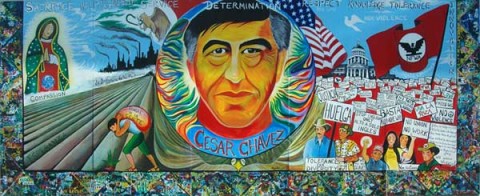Simple Deeds for Justice — ¡Si se puede!
April 7, 2014 1 CommentI saw the new biopic about César Chávez this weekend. Criticisms notwithstanding, I think there is a lot to celebrate and a lot to learn from this film. Here are a few things that struck me.
While details apparently were missing, this was the first I had heard of the solidarity between Filipino and Chicano farm workers. It was a clear example of how race has been used to keep the class system in place in this country.
While the role of women in the movement was not fully explored, I think Helen Fabela Chávez made one of the most important statements in the film as she and César discussed moving from LA to Delano to organize workers from within their ranks. “We can’t ask the people to do anything we are not willing to do.” There is no power like the power of personal experience and personal sacrifice to make change happen.
Personal sacrifice for la causa was a consistent theme. We get glimpses of the impact of the move from LA to Delano on the entire Chávez family, illustrated mostly through the experience of oldest son Fernando. When a former classmate shows up, César offers him a job as the “legal department,” with the salary of five dollars per week, making him both the highest and lowest paid staffer. At just under 4% of median income in 1968, that would be the equivalent of about $40 per week in 2012. And, of course, there was Chávez’ 25 day fast. He said of the fast (an actual quote here, not the movie!) “A fast is first and foremost personal. It is a fast for the purification of my own body, mind, and soul. The fast is also a heartfelt prayer for purification and strengthening for all those who work beside me in the farm worker movement. The fast is also an act of penance for those in positions of moral authority and for all men and women activists who know what is right and just, who know that they could and should do more. The fast is finally a declaration of non-cooperation with supermarkets who promote and sell and profit from California table grapes. During the past few years I have been studying the plague of pesticides on our land and our food,” Cesar continued “The evil is far greater than even I had thought it to be, it threatens to choke out the life of our people and also the life system that supports us all. This solution to this deadly crisis will not be found in the arrogance of the powerful, but in solidarity with the weak and helpless. I pray to God that this fast will be a preparation for a multitude of simple deeds for justice. Carried out by men and women whose hearts are focused on the suffering of the poor and who yearn, with us, for a better world. Together, all things are possible.”
The film also gave glimpses into the integrity, fearlessness, and creativity of the UFW’s strategy to secure rights for farm workers. Chief among these was the transition from strike to boycott—the transition from something that farm workers were doing to something that everyone was doing.
While a motion picture typically isn’t the way to learn about the history of social movements, this one sparked some useful thinking for me. What level of sacrifice am I willing to make for the causes I stand for? How am I working across racial lines to build solidarity? How can I support the kind of boldness and creativity needed to move justice forward in my lifetime? What about you?

1 Comment
Thanks for the review, Danielle. I can’t wait to see the film!